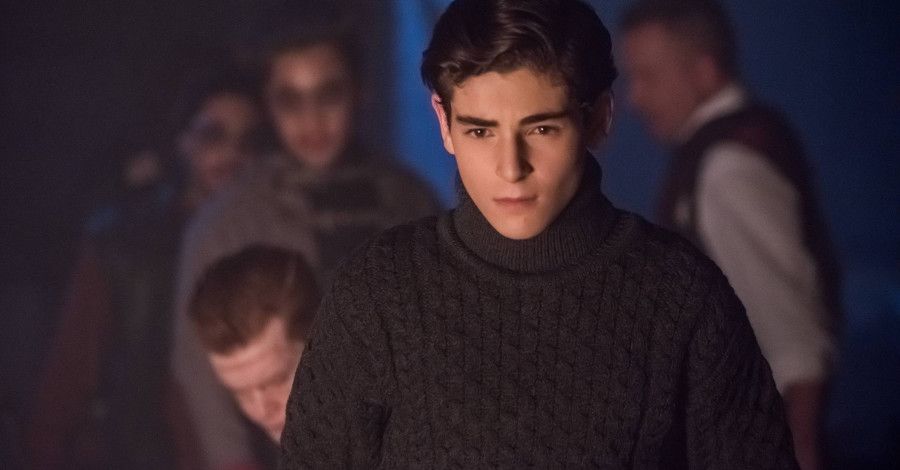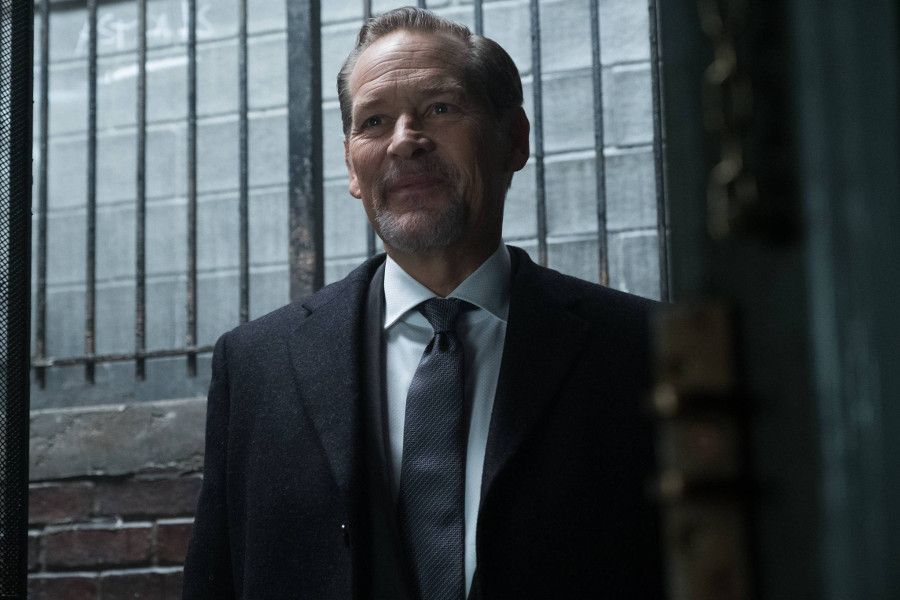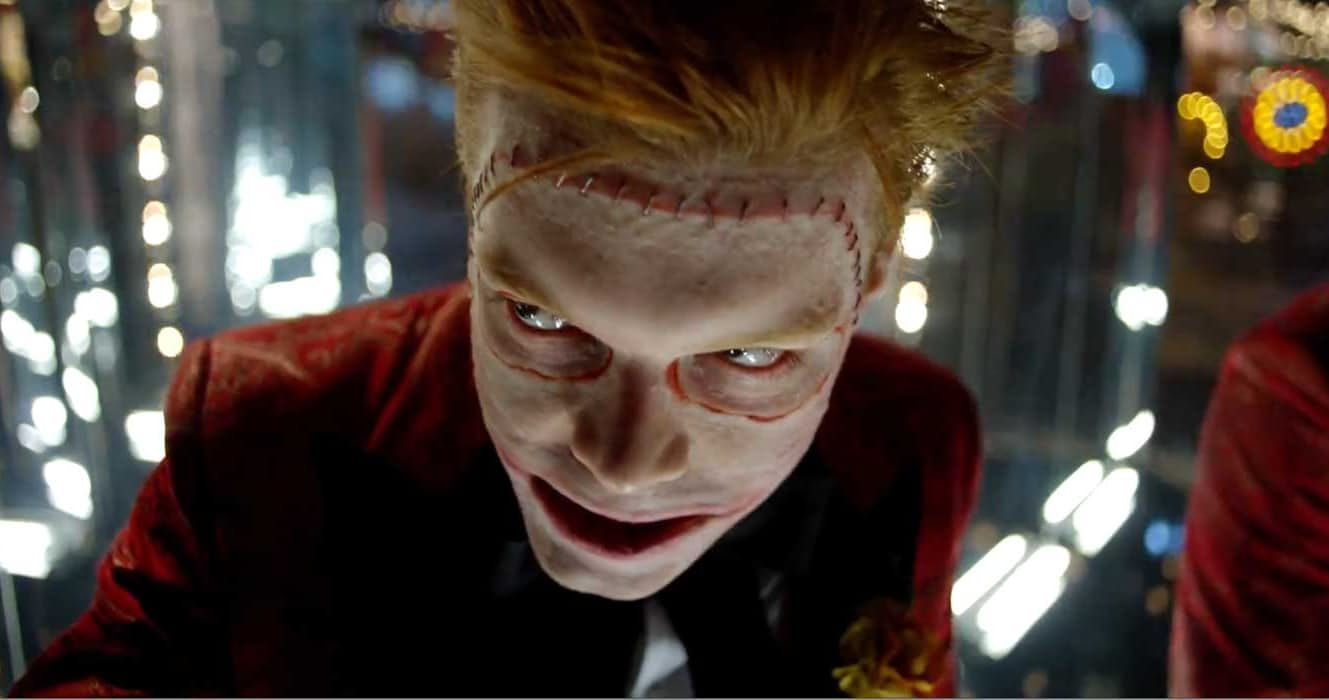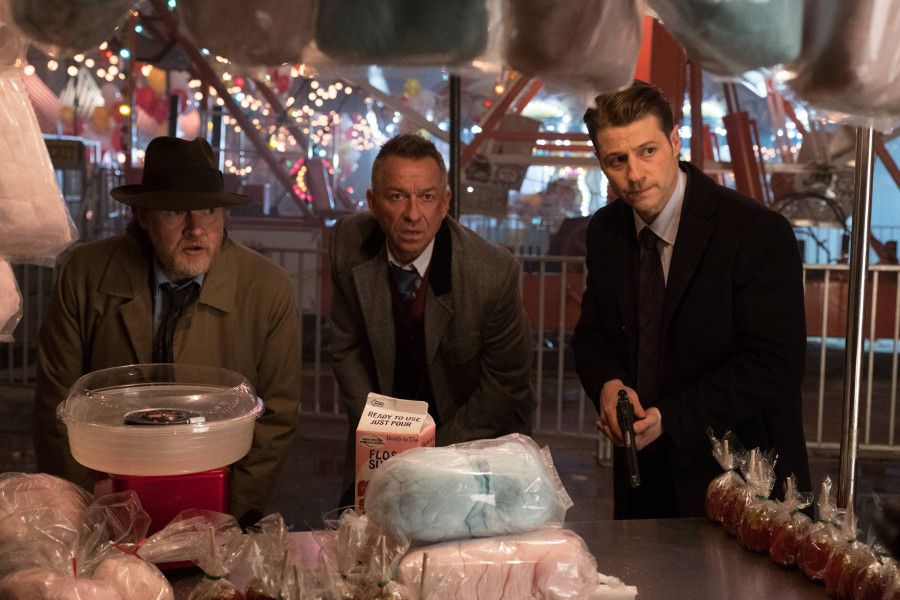It sounds strange to say it now, but after tonight's generally fun, action-packed episode of Fox's "Gotham," the real reason the show has never come together is clear. In short, it was never a Batman show before now. Sure, there are characters from the DC Comics scattered throughout. And there have certainly been moments where "Gotham" has dished up a scene or story that reflect the style of Dark Knight adventures past. But in a bigger sense of identity, the series has lacked that adventurous superhero spark that the world's greatest detective brings to countless comics each year – relying instead on worn out cop show and horror movie clichés.
So it was a pleasure to watch "The Gentle Art of Making Enemies" – an hour that played with everything from the theme of duality to the franchise obsession with death traps in a way only a Batman story can. There were still bumps in the road, and very little indicates the show will stick to this style for long, but for a winter finale, things would be hard pressed to go better.
Part of the reason this hour seemed to rise about the show's general failings was that despite being the end of some long-simmering arcs, the episode felt more like a solo adventure. Like part two of an Adam West episode or the climax of a Scott Snyder comic, what fans got was a clash of good and evil that played up some of the franchises signature elements with a generally satisfying conclusion. And this feat was accomplished on two fronts, with both heroes and villains.
On the criminal end of the spectrum, the story focuses on the long-brewing battle between the Penguin and Ed Nygma. Having lured Mayor Cobblepot to a remote location, Ed reveals himself by killing Oswald's muscle and demanding the crime boss/politician admit his role in the killing of Nygma's love Isabella. While the showdown has been long expected with Ed and company's background planning to destroy the mayor's public life, the twist here comes with a bonafide death trap that sees Oswald chained to the hood of Isabella's wrecked car while a vat of acid waits above to kill him after its ice block restraint melts away. This is as close as the show has gotten to a full-on Bill Finger-style death trap in its history, and while the drama of the confrontation (with Ed excoriating his secret admirer for never loving anyone enough to sacrifice for them) falls a little flat, the zaniness of the idea lands better than any previous attempts like Nygma's recent hand-sized guillotine bit.
But of course, Oswald survives. It's not his infamous sniveling or occasional quick whit that frees the mayor but a random street cop who just happens to be patrolling in an abandoned warehouse. This is the first of many clues that something is very wrong with this storyline. As Penguin strikes out to find Ed, he comes across the riddle-minded defector's former collaborators, but Tabitha, Butch and Barbara seem mysteriously on the outs with Ed even as they're climbing to the top of Gotham's underworld. Luckily, the show doesn't drag out this subplot too long. Faced with the choice to give up where he thinks Nygma may be to the cutthroat cabal or die, Oswald has a moment of clarity and realizes he's willing to sacrifice himself for love. This, of course, was the lesson Ed had been trying to teach him all along, but when the mastermind steps out from behind the curtain (still fully enmeshed in Babs' gang), words fail him. His plan only made sense if the Penguin held true to his penchant for self-preservation, but when the mayor's love appears true, what's a mayor to do?
Overall, the story is a little on the nose in its theme, but the small details read "comic book" in the best way. From the return of Tabby's wily whip to the "villains assembled" showdown, the whole thing played as an homage to classic Batman tropes that, while not really a reinvention of the wheel, ultimately have that fan service fun the show has always lacked. The show even finds a way to bring its own mythology into the mix when a frustrated Ed takes Oswald to the docks to shoot him and dump his body in the harbor. This supposedly foolproof method for killing someone harkens back to "Gotham's" dreary pilot, but here things play out as the final straw in Penguin's long history of conning his way out of assassinations. And though he takes a bullet straight in the gut, no one really expects Oswald to be gone for long. Fans can only hope that when he does reemerge in Nygma's life, their rivalry will continue to push this hard into Rogue's Gallery archetypes rather than tired mobster schtick.
The main attraction holds firmly to Dark Knight lore from the get-go as well with a city overrun by madmen and a plot to kill Bruce Wayne. With dingy clown types overrunning the GCPD and Jerome's gang of idiots making a midnight play to ransack Wayne Manor, the story feels more like a Joel Schumacher Batman story than anything, but the scenes overcome weaker moments like Gordon's ten billionth attempt to solve a crime by threatening a nobody thanks to the anchor that is Jerome. Sure, there are a few plots swirling around here (Jim's attempts to reconnect with the estranged Lee, a mystery man joining the Court of Owls, etc). But the proto-Joker's presence demands the attention of the audience and the most screen time, knocking "Gotham's" mediocre ticks out of orbit for the hour so we can focus on a Jerome vs. Bruce battle.
And let's make no bones about it: centering this story on the first major confrontation between the eventual Dark Knight and his burgeoning arch foe is the idea that saves not only this hour but maybe the show's overall reputation. When Jerome strongarms his way into Wayne Manor with an eye on settling an old score with Bruce, the boy billionaire plays into his vanity at exactly the right moment. Why in the world kill the Son of Gotham in private when a public slaying would further arouse the rebellion of the masses? Bruce's logic is a ruse so obvious even Jerome admits it, but an ego is an ego, and the clown can't help but follow through. This leaves Alfred to fend for himself against three lackeys and leaves the majority of the hour to be a full-on Boy Knight vs. Kid Clown showcase.
The big reason this all comes together creatively is in the performances. Cameron Monaghan's Jerome has improved steadily over the course of his appearances on the show, and in straight jacket-to-carnival barker mode, he's done his best to leave his imprint on the Joker mythos. Sure, it's still a little too indebted to Heath Ledger, but at least for once the character feels funny and menacing rather than a gross-out put-on. Meanwhile, David Mazouz caps off a season in which his talent has grown immensely with scene work that evokes the Batman to come better than ever. The mind of the detective that stays just one step ahead of his foe came across with icy calm, and his occasional dipping into "the Batman voice" was mercifully restrained. As Jerome drags Bruce to his own personal murder carnival, the characters explore a classic Batman/Joker dynamic as the debate over what truly lies at the soul of the city – narcissistic hedonism or quiet dignity – takes center stage. Their battle of ideas is the closest we've gotten to really exploring the strengths of the franchise via character ever on this show, and the visual style matched the duality of the enemies from the bloody makeup Jerome forces on Bruce to the (for once) welcome grotesquery that was the madman's rapidly peeling skin face.
Despite all this great work, there are plenty of low moments in the episode. Jerome's "I'll just kill someone at random" joke gets driven straight into the ground. Gordon's last-minute saving of Alfred and their eventual charge into the carnival are both depressingly by-the-numbers. And the final showdown between Bruce and Jerome in a hall or mirrors is so overdone in the Batman's world that this hardly registers as homage and more like laziness (particularly the way it leans so heavily on "The Killing Joke" as its main vein for creative theft). Even Mazouz, despite his overall strong performance, can't really pull off every moment he's given – particularly the climactic moment where he refuses to kill Jerome for Alfred's (assumed) murder by the clown's goons.
Regardless, expecting "Gotham" to completely reinvent the Batman mythos was never the point. It's okay that this story was little more than fan fiction to dozens of Dark Knight tales done much better. At least it felt like Batman! That theme carries right on to the end where Bruce and Alfred unpack the boy's unwillingness to take a life and establish it as the first rule in the mission the young hero is just starting to realize he's on. It's nice that a series so drenched in blood can acknowledge what the modern movie Batman can't – that killing is a sacred thing to the character, a line never to be crossed. (Just ignore when Bruce pushed a guy out a window a while back, okay?)
In the end, this detour into the right tone, style and story for a Batman drama may be short lived. The last minute reveal that the Court of Owls' new lieutenant is Gordon's uncle is a sign that the show will swerve back into the stories it's been (unconvincingly) building for a while when things start back up in April. But if only for the moment, "Gotham" acted like the hero the city needs.




